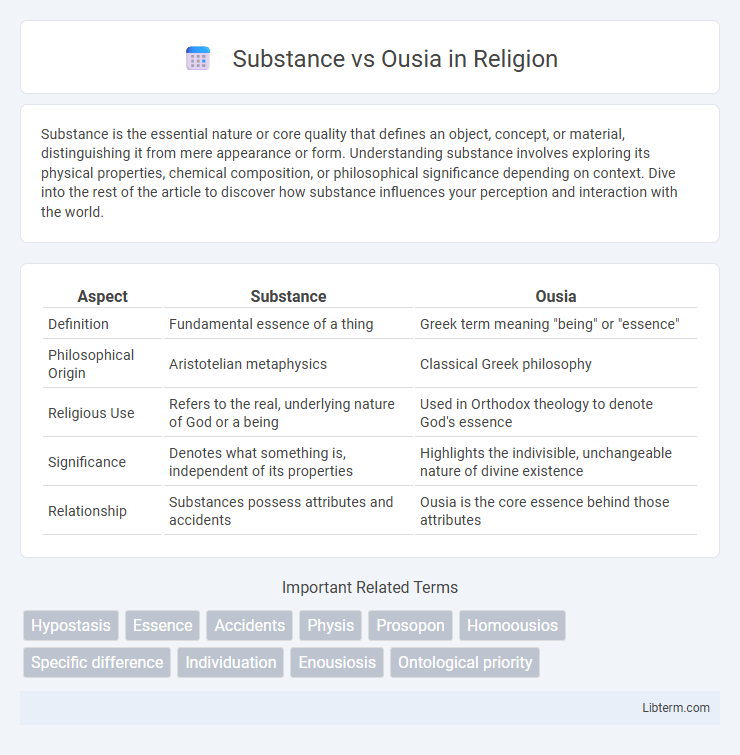Substance is the essential nature or core quality that defines an object, concept, or material, distinguishing it from mere appearance or form. Understanding substance involves exploring its physical properties, chemical composition, or philosophical significance depending on context. Dive into the rest of the article to discover how substance influences your perception and interaction with the world.
Table of Comparison
| Aspect | Substance | Ousia |
|---|---|---|
| Definition | Fundamental essence of a thing | Greek term meaning "being" or "essence" |
| Philosophical Origin | Aristotelian metaphysics | Classical Greek philosophy |
| Religious Use | Refers to the real, underlying nature of God or a being | Used in Orthodox theology to denote God's essence |
| Significance | Denotes what something is, independent of its properties | Highlights the indivisible, unchangeable nature of divine existence |
| Relationship | Substances possess attributes and accidents | Ousia is the core essence behind those attributes |
Defining Substance: Historical Perspectives
Substance, or ousia in Greek philosophy, is fundamentally understood as the underlying reality that exists independently and serves as the subject of properties. Aristotle's Metaphysics defines substance as that which is neither predicable of a subject nor present in a subject, emphasizing its role as primary being and essence. Early debates from Plato to Aristotle elaborated on substance as the core entity that persists through change, distinguishing it from transient accidents or attributes.
Ousia: Origins and Philosophical Roots
Ousia, rooted in ancient Greek philosophy, primarily originates from Aristotle's metaphysical inquiries, where it denotes the fundamental essence or being of a thing, distinct from its attributes or accidents. This concept traces back to the Pre-Socratic philosophers who laid the groundwork for understanding reality beyond mere appearances, emphasizing intrinsic nature rather than external characteristics. Ousia serves as a critical foundation in metaphysics, influencing subsequent philosophical traditions by framing discussions around identity, existence, and the nature of reality itself.
Substance in Aristotle’s Metaphysics
In Aristotle's Metaphysics, substance (ousia) is the primary being that exists independently and serves as the fundamental reality underlying all things. Substance is characterized by its capacity to exist on its own, in contrast to qualities or attributes that depend on it. Aristotle posits that substances are the subjects of predication and change, making them central to understanding existence and essence in his philosophical framework.
Ousia in Ancient Greek Philosophy
Ousia in Ancient Greek philosophy represents the fundamental essence or being of a thing, often translated as "substance" or "essence," and is a core concept in Aristotle's metaphysics. It defines what something is in its intrinsic nature, independent of its properties or accidental attributes, contrasting with phenomena that only appear on the surface. Aristotle identifies ousia as the primary category, signifying individual entities that underpin existence and reality, shaping subsequent philosophical discussions on identity and ontology.
Distinctions Between Substance and Ousia
Substance and ousia, while often used interchangeably in Aristotelian philosophy, represent distinct ontological categories where substance refers broadly to what exists independently and ousia specifies the fundamental essence or "beingness" of a thing. Substance encompasses both primary substances, which are individual entities like a particular tree or person, and secondary substances, which are the species or genera these individuals belong to. Ousia, as the core reality, underpins the existence of substances by defining their intrinsic nature, making it the primary subject of metaphysical inquiry.
Substance and Ousia in Theological Contexts
Substance and ousia in theological contexts refer to the fundamental essence or reality underlying existence, especially in discussions of the Holy Trinity and Christology. Substance (Latin: substantia) denotes the underlying reality that supports attributes, while ousia (Greek: ousia) conveys the true nature or being of God and the persons of the Trinity as one essence. The Nicene Creed affirms the consubstantiality (homoousios) of the Father, Son, and Holy Spirit, emphasizing their shared substance or ousia as central to orthodox Christian doctrine.
Evolution of the Concepts in Western Thought
The evolution of the concepts of substance and ousia in Western thought traces back to Aristotle's Metaphysics, where ousia refers to essence or "being as such," while substance denotes individual entities that exist independently. Medieval philosophers like Aquinas reinterpreted these ideas, merging Aristotelian ousia with Christian theology to emphasize substance as the underlying reality supporting accidents. Modern philosophy shifted focus towards substance as an abstract foundational entity in metaphysics, whereas ousia's emphasis on essence influenced existential and phenomenological inquiries into being and identity.
Substance vs Ousia: Linguistic and Semantic Nuances
Substance and ousia, originating from Latin and Ancient Greek respectively, embody distinct linguistic and semantic nuances that shape metaphysical discourse. Substance in Latin contexts often emphasizes a material or essential entity's concrete existence, while ousia in Greek philosophy, notably in Aristotle's works, signifies the essence or being underlying phenomena. This divergence influences interpretations of identity and existence, where substance aligns with tangible reality and ousia conveys intrinsic nature or essence beyond physical attributes.
Influence on Modern Metaphysics
The distinction between substance and ousia fundamentally shapes modern metaphysics by anchoring debates on the nature of being and existence. Substance is often interpreted as the individual, concrete entity, while ousia aligns more closely with essence or the underlying reality that makes a thing what it is. This conceptual framework influences contemporary discussions on identity, persistence, and the ontology of objects, forming the foundation for inquiries in analytic metaphysics and ontology.
Contemporary Debates on Substance and Ousia
Contemporary debates on substance and ousia engage with the metaphysical foundations of identity, focusing on whether substances are best understood as distinct, self-subsisting entities or as bundles of properties without an underlying essence. Philosophers scrutinize the traditional Aristotelian notion of ousia, questioning its applicability in modern contexts like quantum mechanics and process philosophy, where substance may be more fluid and relational. The discourse explores whether substance metaphysics can accommodate contemporary scientific insights while preserving its explanatory power in ontology and identity theory.
Substance Infographic

 libterm.com
libterm.com